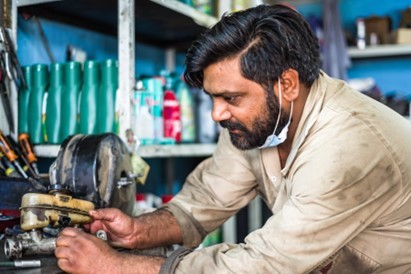 As a kid, did you ever dream of fixing vehicles or putting cars together? As you grew up, did your fascination with everything mechanical continue to grow and develop? If so, then you might be destined to be an auto mechanic. Working as a mechanic can be a rewarding, long-term career opportunity. It comes with a lot of responsibility and can be plenty of fun—particularly if you’re a hands-on person. Mechanics need certain tools, but might not know where to begin, especially if they work independently from a shop. In this article, we’ll tell you about five essential tools to have in your workshop. Let’s get ready to work!
As a kid, did you ever dream of fixing vehicles or putting cars together? As you grew up, did your fascination with everything mechanical continue to grow and develop? If so, then you might be destined to be an auto mechanic. Working as a mechanic can be a rewarding, long-term career opportunity. It comes with a lot of responsibility and can be plenty of fun—particularly if you’re a hands-on person. Mechanics need certain tools, but might not know where to begin, especially if they work independently from a shop. In this article, we’ll tell you about five essential tools to have in your workshop. Let’s get ready to work!
Lighting
If you’re going to work on vehicles, having some sort of lighting is vital. Because vehicles have so many dark areas, good light will make a big difference as you work on a car. Under hood lights are pretty much a necessity for your workshop. A well-lit space is also crucial to prevent injury and perform work correctly. Instead of using antiqued, unsafe work lights, use LEDs instead. LEDs are safer, last longer, and don’t cost much. LEDs are more energy efficient too. An LED offers better lighting and higher lumens suitable for any job. Many LED work lights are rechargeable and rugged, making them perfect for any workshop or garage.
Pneumatic Jack
Every mechanic should have a jack. Not only do mechanics work on engines, but they also need to get under the vehicle for certain repairs. No one can change a tire or wheel without a jack. But instead of relying on a standard jack for your workshop, go with a pneumatic jack instead. Instead of your typical jack that requires manual labor to lift something, the pneumatic jack uses air pressure to effortlessly lift heavy vehicles from the floor. It’s almost magical in the performance of this task. Auto mechanics can also benefit from them due to their durability and exceptional precision/control. These jacks tend to be safer than other types of jacks and are essential to any workshop where heavy objects require lifting.
Hand Tools
Hand tools are some of the most essential items to have in any workshop. Whether you’re a DIY enthusiast, weekend builder, contractor, or mechanic, filling your toolbox with the right tools is critical to get any job done. When it comes to the best mechanics tools, you have plenty of fantastic options. Here are just a few of the necessary and useful tools every mechanic (or enthusiast) should have on hand:
- Drills
- Impact drivers
- Pry bars
- Allan wrenches
- Ratchet
- Pliers
- Heavy scissors
- Crescent wrenches
- Adjustable wrenches
- Socket sets
- Ratchet
- Hammers
Hand tool sets offer many of these items, but it’s up to you to cultivate the storage and types of items you use in your workshop. Don’t forget to keep personal protective gear on hand as well. Rubber and leather gloves are a must if you’re dealing with any kind of dangerous materials. Face protection and eye protection is a good idea anytime you’re working. Feel your workshop with the right-hand tools and you’ll be able to get the job done right every time.
Pressure Bleed System
Working on cars requires draining certain parts of the engine at different times. Oil and cooling systems are high-pressure but are simple enough to do. Draining brake fluid out of the brake system requires a bit more than us. That’s where your pressure bleed system comes in handy. Pressure bleed systems are specifically designed to help you bleed brake fluid during routine repairs/maintenance. You could manually bleed brakes. But that’s time-consuming and not as much fun as using tools to do it. Adding one to your workshop can help you save a ton of time and energy while making most brake maintenance a breeze.
Extra Buckets and Mats
Draining oil. Replacing oil filters. Changing brake pads. As a mechanic, you’re going to be getting dirty. It’s going to be on the floor working on things quite frequently. You’ll also need a place to store all the fluids you drain from a vehicle. So, it stands to reason that extra buckets in math would be a good idea. Even if you have a pit already built into your workshop/garage, you can never have too many buckets. Of course, the number of buckets used is largely dependent on the type of work you do. But when it comes to keeping cars in good working order and decent shape, you’ll want to ensure you have the tools necessary to do so.










